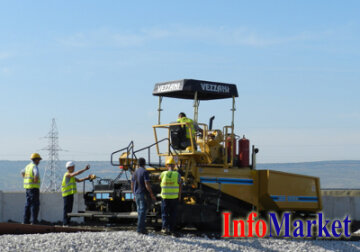
Moldova will receive a 41.2 million euros loan from the EIB and a 12 million euros grant from the EU to modernize the railway corridor Valcinet-Ocnita-Balti-Ungheni-Chisinau-Cainari.
This is stipulated by a relevant financing contract between Moldova and the European Investment Bank, which was ratified by the Moldovan parliament. The document was signed on December 15, 2023 in Chisinau. The beneficiary of the funds allocated by the EIB will be the state enterprise Railways of Moldova (CFM). The loan will have an interest rate of approximately 5.036% and a repayment period of up to 30 years. The deferment fee will amount to 0.125% p.a., while the non-utilization fee will be 0.1% p.a. The mentioned railway corridor is important because it provides rail connections to the industrial environment, as well as export, import or transit of goods from Romania and Ukraine. The railway corridor Valcinet-Ocnita-Balti-Ungheni-Chisinau-Cainari also connects to the railway corridor Cainari-Cimislia-Basarabeasca-Giugiulesti, which is also used for logistics of goods transported to the ports of the Danube and the Black Sea. As noted earlier by Minister of Infrastructure and Regional Development Andrei Spinu, the length of the railway corridor Valcitnet-Ocnita-Balti-Ungheni-Chisinau-Cainari is 446 kilometers, of which a section of 128 kilometers is in poor condition, which creates risks for the movement of trains along it and can disrupt regional logistics chains. "The North-Center rail corridor from Valcinet to Cainari is 446 km long, but on the 128 km section, due to its poor condition, train speeds are very slow, sometimes less than 5 km per hour. We will attract investments from EBRD, EIB and EU to repair and modernize this section to improve the average train speed. The total investment program is estimated at 120 million euros, of which about 40 million euros are EU grants," Andrei Spinu said. He said that the modernization of the railway corridor will have a positive impact on the Moldovan economy, as the necessary conditions will be created to attract new volumes of goods and increase the number of passengers. This is due to the fact that, after the completion of the repair works, the trains' speed will be increased, certain restrictions will be lifted and the travel time between the destinations will be reduced. There will be a significant increase in the possibilities of cargo transportation by rail, including transit and export of grain. The possibility to transport cargo by rail will reduce the volume of cargo transportation by road and relieve the burden on national road routes and border crossings. // 16.03.2024 - InfoMarket.







